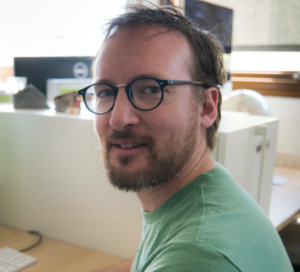As temperature records have continuously been broken all over the world, many of us scientist had to endure extreme conditions in our overheated offices. Climate change is happening, and faster than we’d like to think, but how does this play a role in the scientific community? Geodynamicist Nicolas Coltice - former doctoral student at the ENS de Lyon, professor at the UCBL at the LGL-TPE until 2018 and currently professor at the ENS de Paris - brings elements for reflection.
 In May 2017, Nicolas Coltice was expected to fly to Moscow for a meeting of the Deep Carbon Observatory. He had begun to assess his carbon footprint a few years earlier and the relevance of his trips to do science - on carbon, in particular - was questioning him. This flight was therefore the final one in his professional activity. Since then, he has been thinking about his work as a scientist. By identifying carbon footprint assessment tools to determine how to reduce emissions, he quickly endorsed the guidelines proposed by the Tyndall Center for Climate Change Research:
In May 2017, Nicolas Coltice was expected to fly to Moscow for a meeting of the Deep Carbon Observatory. He had begun to assess his carbon footprint a few years earlier and the relevance of his trips to do science - on carbon, in particular - was questioning him. This flight was therefore the final one in his professional activity. Since then, he has been thinking about his work as a scientist. By identifying carbon footprint assessment tools to determine how to reduce emissions, he quickly endorsed the guidelines proposed by the Tyndall Center for Climate Change Research:
- Monitor and reduce: I will keep track of the carbon emissions of my professional activities, and set personal objectives to reduce them in line with or larger than my country’s carbon emissions commitments (…).
- Account and justify: I will justify my travel considering the location and purpose of the event, my level of seniority, and the alternative options available.
- Prioritise, prepare and replace: For activities that I organise, I will choose the location giving high priority to a low carbon footprint of travel of the participants, and I will encourage, incorporate and technically support online speakers and webcasts to reduce unnecessary travel.
- Encourage and stimulate: I will resist my own FOMO (Fear Of Missing Out) from not attending everything and work towards sensitizing others to the need of the research community to walk the talk on climate change.
- Reward: I will work with my peers, Institute and Funders to value alternative metrics of success and encourage the promotion of low-carbon research as a realisable alternative to a high-carbon research career.






